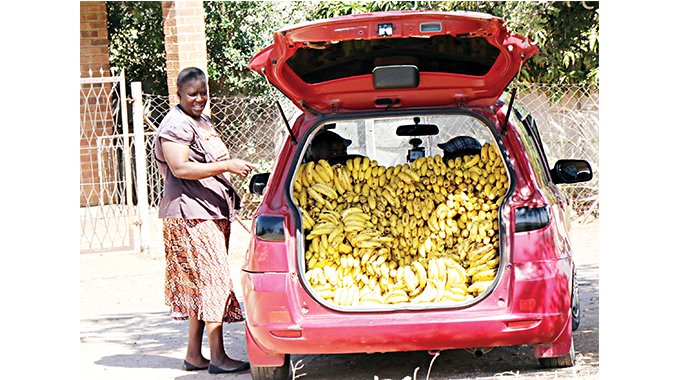Behaviour change a concern amid Covid-19

Nkosilathi Sibanda, Features Correspondent
The Government is telling the people to behave responsibly so that Covid-19 can be curbed. People are being told to limit movements, wash their hands with soap regularly, wear face masks and uphold social distancing.
However, for some like Elphas Ncube of Bulawayo and his friends who are into small time vending, staying at home is not an option. They travel on foot to look for mealie meal for resale in other townships, joining crowded queues. It is there where they shake hands and hug whoever they meet.
Their eye is on the prize- to get as many bags of the maize meal as they can. Even the now popular social distancing jingle, “Siyayinqoba iCorona” played on a hailer from a police vehicle doing rounds in the neighborhood doesn’t make them move a leg.
Information, educational and communucation material against Covid-19 is pasted in most public areas such as shopping malls. Of late, TV and radio stations have played public health service announcements with the aim of reaching out.
If they are not selling maize meal, Ncube and crew get their hands on anything that is hard to come by during the lockdown. With unprotected hands and no running water nearby, they handle tomatoes, green vegetables and occasionally they bootleg whiskey.
These traders have assumed the role of grocery brokers known to some as “hustlers”.
In their everyday grind, they remain undeterred by the lockdown recommendations, and the health effects they expose themselves to and the community they serve.
Ncube and his friends constitute, as many Zimbabweans trading in food stuffs, a group which ‘dilly-dallies’ with life as they continue to eke a living, without a wink on the risk they pose, in particular with their unhygienic demeanor.
These unwarranted behavioural traits are getting in the way of efforts to pin down the spread of the deadly coronavirus. Since the commencement of the national lockdown in March, an increase of cases that tested positive for Covid-19 was recorded. By yesterday, the country had 37 Covid-19 positive cases, 12 recoveries and four deaths. Also, more than 25 000 people have been arrested for defying simple lockdown regulations such as the need for them to stay at home.
“It is better to die of corona than to watch my children go to bed without food. I need the money,” said Ncube as he stood neck to neck with other residents on a queue for maize meal at Entumbane shopping mall.
According to the World Health Organisation (WHO), social distancing, staying at home away from crowds and wearing protective clothing can prevent infection with the virus.
Regrettably despite the threat of Covid-19 and public awareness activities by the Government, some like Ncube are not adhering to the measures.
The underlying factor contributing to that negative behaviour is economic need, some claim. However, in other cases, it is because of pure recklessness.
Such self-defeating behaviour is not entirely new.
At the height of the HIV and Aids pandemic in the 1990s to the early 2000s, people’s slow reaction to positive behaviour change was among the reasons why infections increased. The negative behaviour patterns soon gave way to denial, stigma and discrimination.
Such is the scenario with Covid-19.
First it was denial that swept public perception about the novel coronavirus with unsubstantiated claims that it only affects certain social classes and races. So wide and deep was the stigma that followed thereafter.
A medical doctor specialising in respiratory ailments at one of Bulawayo’s referral hospitals urged people to adjust their attitudes for the country to curb the coronavirus.
“It has been more that 35 days into the lockdown and the prevention measures against the virus are commnunicated. You wonder how people want to be told about their lives. It is a matter of responsible behaviour. A change in the way we comply with directives that seek to save our lives is paramount. People have to be mature,” said Dr Norman Moyo, also a public health researcher.
“I understand that it is not all of us who are quick to digest messages but that doesn’t mean we have to watch and do nothing.”
Bulawayo Provincial Medical Director Dr Welcome Mlilo said negative behaviour such as non-compliance to lockdown measures was a let-down to all Government efforts.
“It seems people have taken a view that they are on holiday, children are playing on the streets and others are unnecessarily going into town. It is an issue of whether we are following the lockdown measures that have been put into place,” he said.
Dr Mlilo explained that it doesn’t help for people, especially in the townships to maintain a “rigid” mentality on the need to change their behaviour.
“The public needs to understand that Covid-19 is with us. It is not a theory. We need to be responsible for each other,” he said adding that by simply following prevention messages, the viral outbreak can be controlled.
“Behaviour change starts with following messages from relevant authorities. Washing hands, practising social distancing and wearing personal protective clothing such as masks. That’s what we must all do.”
The Zimbabwe Republic Police has made repeated calls that punitive measures are there for those that defy Covid-19 preventative regulations. Social delinquents risk arrest and fines of up to $500 if they are caught, for example, without masks on while in public places.
National police spokesperson Assistant Commissioner Paul Nyathi is on record saying there can be no excuse to defying Covid-19 public health measures.
“We are here to enforce the directive and those who choose to ignore will be arrested until there is total complaince.
“We are urging the public to comply with every measure and the directive from Government meant to protect everyone’s life, said Asst Comm Nyathi.
A public psychologist and social behaviour researcher Mr Amon Marko said:
“It is worrying that our people want to be forced to behave, when in fact this concerns their lives. If one presents a kind of negative attitude when told to wear a mask, it either shows that they don’t trust health authorities not they are doing so purposely.”
He added: “There is no other way to fight the virus than to work with people’s minds. Public health messages coupled with intense regulatory measures have to be done full scale. A level of psychological help is also needed to assist our people.”








Comments